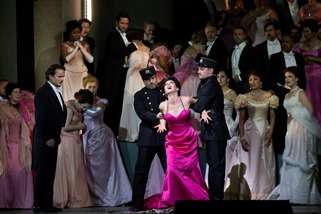|
Back
Languid Self-Pity Falls Flat in New York New York
Metropolitan Opera
09/24/2019 - & September 28, October 2, 5, 19, 22, 26, 2019
Jules Massenet: Manon
Carlo Bosi (Guillot de Morfontaine), Brett Polegato (de Brétigny), Jacqueline Echols (Poussette), Laura Krumm (Javotte), Maya Lahyani (Rosette), Paul Corona (Innkeeper), Artur Rucinski (Lescaut), Lisette Oropesa (Manon), Michael Fabiano (Chevalier des Grieux), Kwangchul Youn (Comte des Grieux)
Metropolitan Opera Chorus, Donald Palumbo (chorus master), Metropolitan Opera Orchestra and Chorus, Maurizio Benini (conductor)
Laurent Pelly (production and costumes), Chantal Thomas (set designer), Joël Adam (lighting designer), Lionel Hoche (choreographer)

(© Marty Sohl)
The opening of the New York season is always a grand affair, but this year’s has been unusually charged with the anxious spirit of our troubled times. With racial tensions rising, the Metropolitan Opera opened its 135th season with a stunning and energetic new production of Gershwin’s Porgy and Bess, a work restricted by copyright to African-American performers that the house has not seen for more than thirty years. The next day, superstar tenor, conductor, and arts administrator Plácido Domingo withdrew from the Met’s revival of Verdi’s Macbeth (and likely from all future Met performances), scheduled for the new season’s third night the following evening under severe pressure from sexual harassment allegations at other opera companies and consequent tension with Met orchestra and chorus members. Almost simultaneously, the Royal Opera suspended prominent tenor Vittorio Grigòlo, performing on tour with the company in Japan, as the result of a similar accusation. The United Nations usually holds its general session during the same week, wreaking havoc on Manhattan traffic as always, but this year it featured US President Donald Trump speaking just as an impeachment inquiry was launched in Congress, UK Prime Minister Boris Johnson facing massive constitutional obstacles to Brexit, and teenage climate change activist Greta Thunberg melodramatically declaring that world leaders have stolen her childhood.
It was almost a relief that the Met’s second performance of the season, a revival of Laurent Pelly’s fanciful production of Massenet’s Manon, attracted no controversy, though the chatter about Domingo was inescapable. It may have been a consequence of the high energy of the week’s other events, but something was missing from this elegy to infatuation, betrayal, and reconciliation. Having premiered with Anna Netrebko (cast in the Macbeth revival from which Domingo withdrew) and Piotr Beczala in 2012, and revived with Diana Damrau and the accused Grigòlo more recently, this production’s standards of passion set a high bar. Alas, the younger soprano Lisette Oropesa was not up to the challenge. The voice is pleasant and lends itself well to the flirtations with des Grieux in Act I, but it was hard to take her seriously as a seductress, which the role demands in spades. The Saint-Sulpice scene was pallid, with Oropesa’s Manon acting more like a clingy reject than a hoovering narcissist who will stop at nothing to recover a passion that she regards more as property than as a soul she truly loves. Michael Fabiano’s des Grieux fared somewhat better, delivering an affecting “Ah fuyez, douces images,” and projecting a healthy and buoyant lyricism throughout the evening. But he seemed oddly uninspired. Artur Rucinski faced too much propriety in the character of Lescaut (here Manon’s cousin rather than brother) to generate much interest, despite some solid baritonal singing. Kwangchoul Youn’s profound bass delivered the role of des Grieux’s father with impressive authority and, notably, with the most comprehensible French in a cast that suffered from poor diction.
Maurizio Benini led a workmanlike performance at best. Pelly’s production updates the action of the opera from the ancien régime France of the original story to the late nineteenth century Belle Epoque. This allows for a bit more stylistic color but serves no significant purpose. With all the allegations flying around, it was surprising to see the corps de ballet chased around and manhandled by lustful Parisian dandies. I am the world’s least censorious critic, but it seemed a little out of step with the dramas happening backstage.
Paul du Quenoy
|